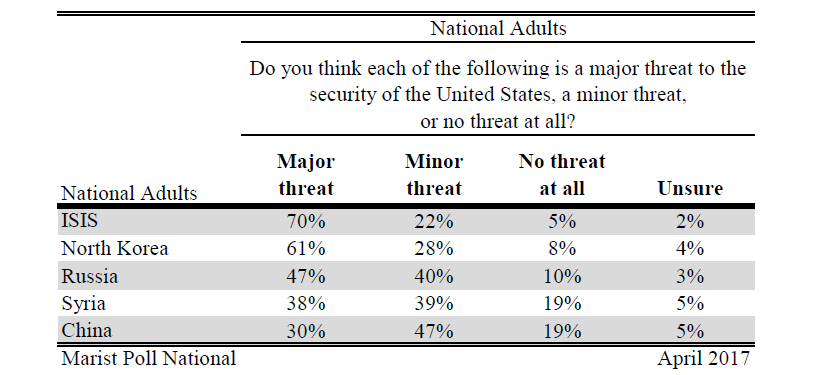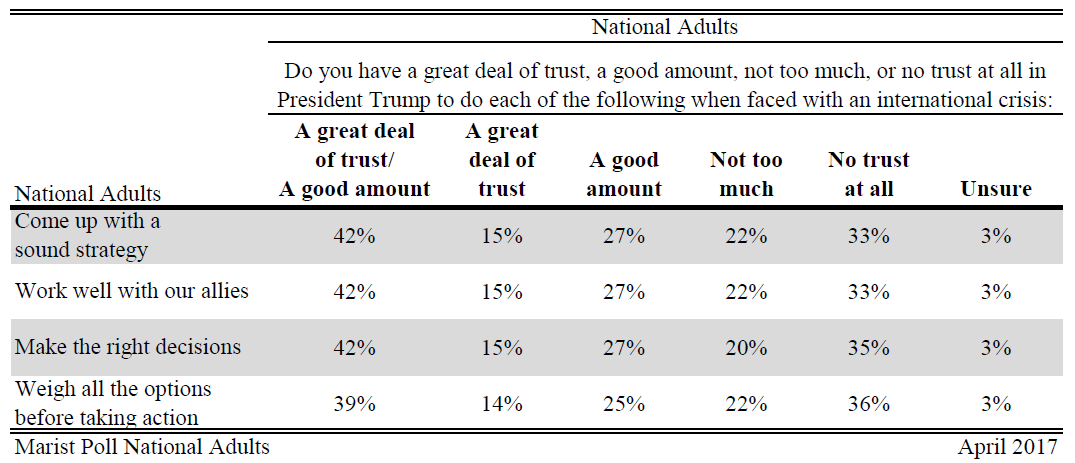April 14, 2017
4/14: International Tensions Heightened, Say Many Americans
Marist National Poll
Despite a political environment fractured by partisan differences, there is consensus among Americans that tensions around the world are escalating. And, a great deal of agreement exists about the powers that pose the greatest threat to the national security of the United States.
President Donald Trump has taken a more prominent role on the international stage in light of the recent developments abroad, but he has not rallied the majority of American people behind him. A wide partisan divide exists, and the president has yet to gain the confidence of Americans beyond his core Republican supporters.
The president’s overall job approval rating stands at 39% among registered voters, little changed from when Marist last reported it just one week prior to the U.S. air strikes in Syria. While the president’s negatives in areas such as his image, how he has been handling foreign policy, and whether or not he is improving the U.S. position on the world stage have declined, his scores on each of these questions remain upside down. A slim majority of Americans also do not have confidence in the president to keep the nation safe, and there is a lack of trust in the president, when faced with an international crisis, to weigh all the options before taking action, come up with a sound strategy, work well with allies, or make the right decisions. A majority of Americans still do not think the president is a good leader for the nation.
“As tensions mount, President Trump is facing a critical test as Commander in Chief,” says Dr. Lee M. Miringoff, Director of The Marist College Institute for Public Opinion. “Instead of a rally ‘round the flag effect, Americans are still looking for President Trump to provide leadership and more careful planning to arrive at sound policies.”
On the issue of Syria, a majority of Americans favor limited air strikes in response to the chemical weapons attack, but nearly six in ten do not think President Trump has a clear vision for what to do there. A plurality of Americans support the removal of Syrian President Assad but do not want the United States to take an active role in his ousting.
Digging deeper into the data, 72% of Americans think tensions around the world are rising. One in five, 20%, believe things are pretty much the same as they usually are, and only 5% believe global tensions are easing.
Rare partisan consensus exists on this question. Although Democrats, 85%, and independents, 70%, are more likely to think tensions around the globe are heightened, even 64% of Republicans say the same.
Which nations or groups do Americans consider to be a major threat to the security of the United States? Seven in ten, 70%, believe ISIS is a major threat. When asked about North Korea, 61% believe that nation poses grave danger to the United States. Fewer than half of residents nationally, 47%, perceive Russia to be a major threat to America’s security, and only 38% say Syria is a great danger. 30% consider China to be a major threat to the national security of the United States.
President Trump’s job approval rating is at 39% among registered voters, little changed from the 38% score he received late last month. 49% currently disapprove, and 12% are unsure. Not surprisingly, 80% of Republicans, compared with 12% of Democrats, approve of the job the president is doing. 32% of independents agree. When Marist last reported this question, a similar 78% of Republicans, 9% of Democrats, and 34% of independents approved of the president’s job performance.
President Trump’s favorable score remains upside down. 53% of Americans say they have an unfavorable impression of the president, relatively unchanged from the 54% he received last month. The president’s favorable score is at 38%, comparable to the 37% last time.
On his handling of foreign policy, President Trump’s disapproval rating has declined. 49% of registered voters nationally disapprove of how the president is tackling foreign policy, a decrease from 56% in February. Currently, 40% of voters say they approve of how Trump is handling foreign policy. This has inched up from 37% last time.
40% of Americans say Trump’s decisions as president are strengthening the U.S. on the world stage, up from 35% last month. 49% report the president is weakening the nation’s status internationally, down from a majority, 56%, previously. Many Republicans, 79%, perceive the president to be bolstering America’s role globally. This compares with 13% of Democrats. 35% of independents believe the president is improving the United States’ position internationally.
47% of Americans have either a great deal of confidence, 24%, or a good amount of confidence, 23%, in the president to keep the United States safe. 52% have either not too much, 23%, or no confidence at all, 29%, in the president to do so. Most Republicans, 85%, have at least a good amount of faith in Trump to protect the nation while most Democrats, 82%, have little or no confidence in his ability to protect Americans. A majority of independents, 53%, lack faith in President Trump to keep the United States safe.
When faced with an international crisis, majorities of Americans have little or no trust in President Trump to weigh all the options before taking action, make the right decisions, work well with our allies, or to come up with a sound strategy. On each of these questions, at least 55% of Americans lack confidence in the president.
A majority of registered voters are not convinced that Trump is a good leader for the nation. 54% either disagree, 16%, or strongly disagree, 38%, with this notion, like the 54% who had this view in February. More than four in ten, 41%, either strongly agree, 16%, or agree, 25%, that the president is a good leader for our country. This is comparable to the 43% of registered voters who had this opinion previously.
Nearly half of Americans, 49%, think President Trump’s involvement in international issues is appropriate. 25% say he is getting too involved, and 17% do not think he is involved enough.
A majority of Americans, 56%, favor limited U.S. air strikes on military targets in Syria in response to the Syrian government’s use of chemical weapons. 35% oppose such military actions, and 9% are unsure. When this question was asked in 2013 during the Obama administration, 32% of Americans supported air strikes, and 58% opposed them. 11%, at that time, were unsure.
More than eight in ten Republicans, 81%, favor the most recent air strikes, and a majority of independents, 57%, agree. A plurality of Democrats, 48%, oppose employing air strikes in response to the Syrian government’s use of chemical weapons.
Despite majority support for limited military air strikes in Syria, nearly six in ten Americans, 59%, do not think President Trump has a clear idea about what he wants the U.S. to do there. 34% believe he does have a clear idea, and 7% are unsure. When this question was asked about President Obama in 2013, one year into his second term, 50% of Americans thought his strategic vision for Syria was muddied. 41% said it was clear, and 8% were unsure.
A plurality of Americans, 42%, support the removal of Syrian President Assad but do not think the United States should take an active role in his removal. Nearly three in ten, 28%, do not think the U.S. should be involved at all, and 22% say the United States should take an active role in removing Assad. Eight percent are unsure. Pluralities of Democrats, 47%, and independents, 47%, support the removal of Assad but do not want the U.S. actively involved. A plurality of Republicans, 39%, agree.
When thinking about Russian President Putin, about two-thirds of Americans think he is more of an enemy to the United States, 63%, than an ally, 23%. 15% are unsure. Regardless of party, at least a majority believes Putin is a foe to the United States. Democrats, 76%, are more likely than Republicans, 56%, and independents, 62%, to have this view.
Which tactic should the United States employ in its dealings with North Korea? Nearly seven in ten, 69%, say the U.S. should mostly use diplomacy. 23% believe military action is necessary. Eight percent are unsure. About three in four Democrats, 74%, and independents, 76%, believe diplomacy is the best course of action. Nearly six in ten Republicans, 59%, agree.
Many Americans, 67%, have been following the international events in the news this past week. This includes those who have been following the developments very closely, 29%, or closely, 38%. 33% say they have not been following it very closely, 22%, or not at all, 11%.
When it comes to the source of news Americans have been using to follow these events, 46% mention television followed by online news sites or mobile news apps, 24%. Social media such as Facebook or Twitter and radio each receives 11%. Seven percent cite newspapers or magazines. The plurality of Americans under 45 years of age, 36%, get their news from online news sites. 24% cite television while a notable 21% get their information from social media. 64% of those 45 or older get their news from television.
Turning to the generic ballot for the 2018 election for Congress, a plurality of registered voters, 45%, report they are more likely to vote for the Democrat in their district. 38% would back the Republican, and 7% say they would not support either the Democrat or the Republican. 10% are undecided. These proportions are little changed since this question was last reported in March.
When thinking about the direction of the nation, a majority of Americans, 57%, say it is moving in the wrong direction, similar to the 59% last month. 35%, comparable to 34% last time, report it is going in the right one, and 8% are unsure.
Complete April 14, 2017 Marist Poll Release of the United States
Complete April 14, 2017 Marist Poll of the United States (Tables of Adults and Registered Voters)



